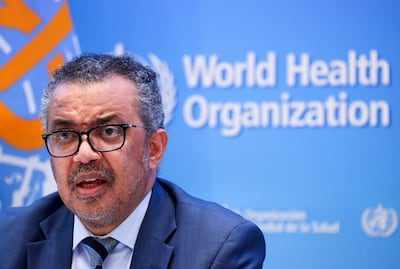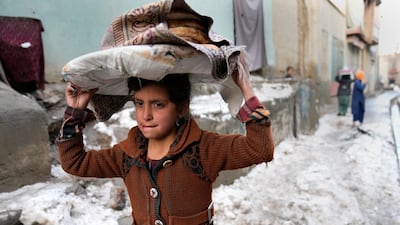The head of the World Health Organisation said on Wednesday that he had met the Taliban's health minister for talks on the “dire” health and humanitarian crisis in Afghanistan.
WHO chief Tedros Adhanom Ghebreyesus revealed that he met Qalander Ebad for talks on Tuesday.
Mr Ebad is part of a Taliban delegation visiting Geneva for a week of talks with institutions and non-governmental organisations on humanitarian access and human rights, as Afghanistan's new rulers expand their international engagement.
The extremist movement returned to power in Kabul in mid-August as the US ended its 20-year war in Afghanistan.
Since then, Afghanistan has been plunged into financial chaos, with inflation and unemployment surging, and the halting of aid has triggered a humanitarian crisis in a country already devastated by decades of war.
Dr Tedros had already met Mr Ebad during his visit to Kabul in September 2021 following the Taliban takeover.
“Despite some improvements since then, the health situation in Afghanistan is still dire and the acute humanitarian crisis is continuing to put lives at risk,” Dr Tedros said.
He said they discussed health needs in the country, strengthening the health system, emergency preparedness and training the health workforce — an area in which women are central.
“The acute need in Afghanistan is to deliver diagnostics to detect the Covid-19 virus, and in particular Omicron, as the number of cases is on the rise,” Dr Tedros said.

The Taliban delegation, representing what it calls the Islamic Emirate of Afghanistan, is in Switzerland at the invitation of Geneva Call, which works to protect civilians during conflict.
The foundation is hosting a conference on Afghanistan behind closed doors from Monday to Friday aimed at enhancing the unimpeded delivery of humanitarian assistance to the country.
Dr Tedros said the WHO was supporting the Covid-19 response in Afghanistan as well as its polio and measles immunisation campaigns.
“We also discussed progress on girls' education at all levels, including higher education and support for joining the health workforce,” the UN health agency chief said.
“The WHO calls on the international community to continue with dialogue to support the people of Afghanistan, so that we improve the health and well-being of all Afghan people.”
The Taliban delegation will also meet Swiss and other European officials as well as members of the Red Cross during its visit — though Switzerland's foreign ministry insisted its presence on Swiss soil did not constitute recognition of the government.
The Geneva-based medical charity Doctors Without Borders (MSF) said it too would hold talks with the delegation.
“MSF has been in contact with the [Taliban] health ministry for several years in the context of our medical activities in Afghanistan. We will meet with them during their stay in Geneva to discuss current medical needs and our plans,” a spokesman told AFP.


